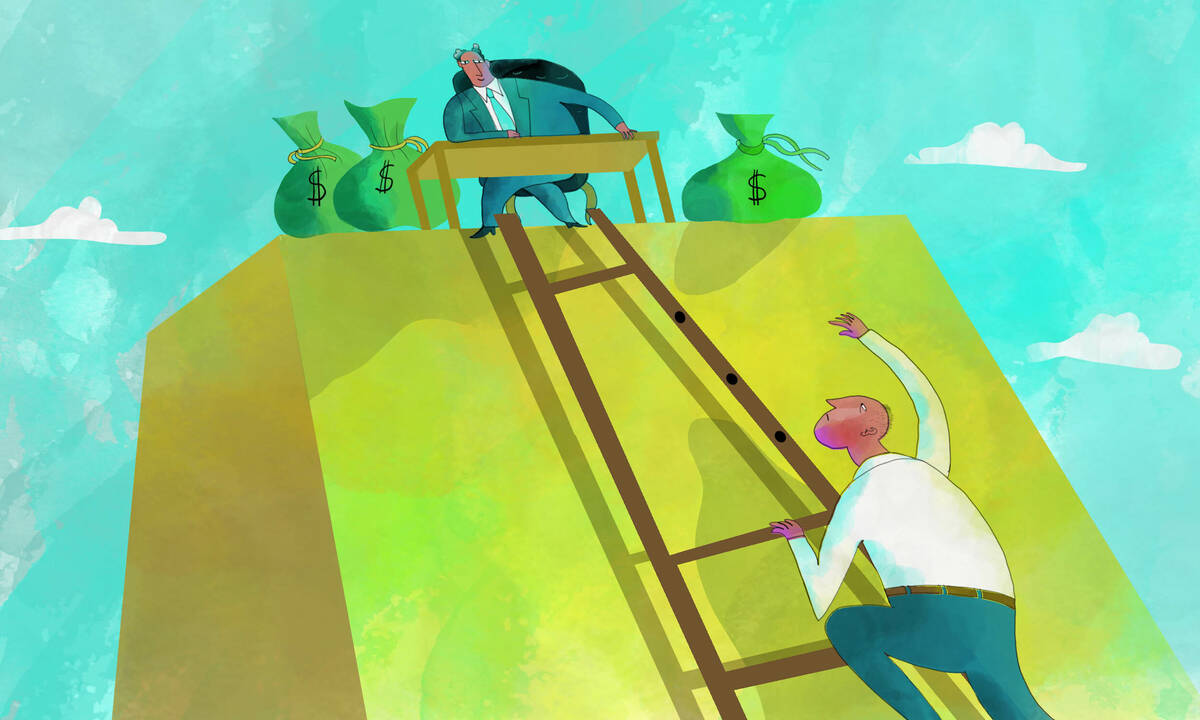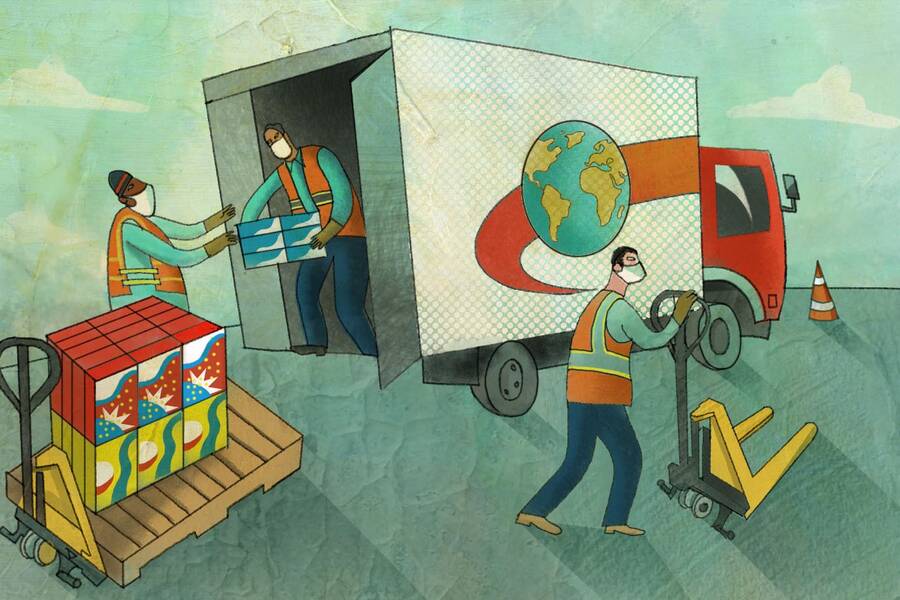Organizations Sep 1, 2023
Knowing Your Boss’s Salary Can Make You Work Harder—or Slack Off
Your level of motivation depends on whether you have a fair shot at getting promoted yourself.

Yevgenia Nayberg
Hit those quarterly goals, and you’ll get a bonus. Make your yearly quota, and you’ll get a raise. Fail at both, and you might be punished.
While private-sector organizations can use such incentives and threats to increase motivation and performance, managers in the public sector are often unable to offer performance-based pay and face difficulties in dismissing low-performing employees.
These organizations often rely on promotion incentives instead. To earn a higher salary, they tell workers, you must work hard and move up the ladder.
Erika Deserranno, an associate professor of managerial economics and decision sciences at Kellogg, wanted to know just how well that approach really works. There was little existing research to support the notion that meritocratic promotions—and the associated pay boost they bring—act as a strong incentive for workers.
So, to learn more, Deserranno conducted an experiment on a relatively new community health program run by Sierra Leone’s Ministry of Health and Sanitation.
Teaming up with Philipp Kastrau of IDinsight and Gianmarco León-Ciliotta of Pompeu Fabra University, she tested a new promotion system that linked promotions to performance. The team also studied what happened when workers learned the salary of their supervisors, a move intended to motivate advancement.
The results painted a clearer picture. For workers who were both under the new promotion system and learned what their bosses were making, performance improved, with the greatest increases coming from the top performers. However, for those who were not included in the new system tying promotions to performance, learning their supervisors’ salaries often led to poor morale and lower productivity.
The results could have implications not only for the public sector but also for the private sector, where gender and race gaps in promotion persist. While much of the private sector is ostensibly meritocratic, women and non-white workers are often excluded from the meritocracy. That means they could be less motivated to perform their best.
As a result, measures intended to incentivize strong performance by highlighting the perks of advancement can backfire. “Companies tend to increase pay for higher-level workers without thinking about the effect it has on lower-tier workers,” Deserranno says. “A system needs to be fully meritocratic for promotions and pay progression to motivate employees.”
Creating a new meritocratic system
Sierra Leone, one of the poorest countries in the world, faces a host of public-health challenges, including high maternal-mortality and child-mortality rates. To help change this, Sierra Leone’s Ministry of Health and Sanitation created a national Community Health Worker program in 2017.
The program instituted regional health units staffed with doctors and nurses that also include a group of 8 to 10 community health workers and one peer supervisor. The community health workers visit households within a village, offering health education, basic medical care, and referrals to medical clinics. Both the community health workers and their peer supervisors work part time and typically have another occupation, such as farming or shopkeeping.
The workers earn about $17.50 a month in their role, while supervisors earn about $29.20—67 percent more than the workers. Supervisor positions only open up when supervisors retire (usually at age 55) and are filled by one of the community health workers in the group. Historically, this promotion has not been linked to performance; there is a widespread perception that the promotion goes to whomever is best connected to the head of the regional health unit.
“Companies tend to increase pay for higher-level workers without thinking about the effect it has on lower-tier workers.”
—
Erika Deserranno
To find out if changing the promotion system from cronyism to a meritocracy would improve employee performance, Deserranno and her team conducted an experiment in the fall of 2018 involving more than 2,000 community health workers and their 372 peer supervisors.
The workers were randomly assigned to one of four groups within the experiment. Half the health workers were told they’d be part of a new meritocratic system in which promotions to supervisor would be tied to performance, while the other half remained within the existing system. Within these two groups, half of the community workers were told about their supervisor’s salary, while the other half weren’t.
The potential promise of promotion
To establish a baseline measure of worker performance, Deserranno and her team had supervisors provide an initial assessment of each community health worker, ranking them from best to worst. Community health workers were also surveyed about their perceptions of meritocracy within the system and asked to guess how much their supervisors made each month. Then, the research team surveyed households in the villages ten months after the experiment began to see how the number and length of visits had changed.
They found that the new meritocratic promotion system boosted the number of visits by 22 percent across both the group that learned their supervisor’s salary and the group that didn’t. The length of visits also increased by 15 percent overall.
The improvements were especially pronounced among the top-performing workers (as ranked by their supervisors), who increased their number of visits by 38 percent. The promise of a potential promotion also seemed to provide a real motivation: workers who expected their supervisor to retire within the next two years increased their number of visits by 45 percent.
“It shows that top workers were now more motivated to provide more effort, because it may lead to a promotion,” Deserranno says. “It is essentially a tournament. Only the top person will be rewarded. Though that increase was concentrated at the top, the meritocratic system did not reduce the performance of low-ranked workers. No one has an incentive to provide less effort.”
The promise of higher pay also played a role in the increased number of visits. Those under the new meritocratic system who had underestimated their supervisor’s pay—and then found out it was more—increased their visits by 23 percent.
Meanwhile, the knowledge of supervisor salary had mixed effects under the old non-meritocratic system. Workers’ expectations of their supervisors’ salaries proved to be important: Those who overestimated it or who guessed right didn’t change their patterns. But those who underestimated their supervisor’s pay, and then learned it was more than they thought, actually decreased their number of visits by 27 percent.
“They’re mad,” Deserranno says. “They think the supervisor earns more than they do and there is no way for them to get a supervisor job by performing more. And when they are unhappy, they provide fewer visits. The extent to which the workers were really unhappy with pay progression and no meritocracy was surprising. The reduction in visits was equal to the increase in visits in the meritocratic system.”
Promotions with pay increases work—but only if they are within reach
Though the experiment took place in a very specific context, the implications are wide-ranging, including for the U.S. Since women and people of color are less likely to be promoted, even when they are high performing, they are more likely to view the system as non-meritocratic. If their hard work is not rewarded with a promotion, it could result in low morale and poorer performance.
Similarly, having a wide salary gap between bosses and workers can hurt U.S. organizations as well. The difference between what a CEO makes and what an average worker makes is ever-increasing, but even less-stark disparities can have negative effects. If a middle manager’s employees find out their boss is significantly outearning them, it could lower morale—unless they believe their organization is truly meritocratic and they have a realistic possibility of advancement.
“If you increase pay for the boss, that’s good for the boss, but the people at the bottom will be mad,” Deserranno says. “If the system is not meritocratic, it can backfire.”
Emily Ayshford is a freelance writer in Chicago.
Deserranno, Erika, Philipp Kastrau, and Gianmarco León-Ciliotta. 2023. “Promotions and Productivity: The Role of Meritocracy and Pay Progression in the Public Sector.” Working paper.



